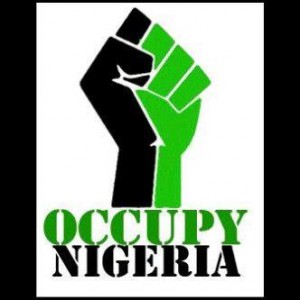I have waited quite a while to write this. Perhaps I was waiting to see how the first day of the strike would turn out. The initial protest march to Gani Fawehinmi Park took place on the 3rd of January, as an immediate reaction to the removal of subsidy. The turn out that day surpassed even the most optimistic expectations, as some left work to join the march.
If that was surprising, the turn out for the first day of the NLC strike was unprecedented. Gani Fawehinmi Park has become the headquarters for the Lagos arm of ‘Occupy Nigeria’, and as I deliberately got ahead of the crowd and looked behind me, I realized I had never seen so many people on the streets at the same time.
By lifting the lid on petrol prices, the lid has been lifted on the anger of Nigeria’s youth. This is an anger that has been simmering for a while. It would be interesting to know what other democratically elected leader in recent times, having ridden to power on the wave of immense goodwill, has lost so much popularity in so short a time. It seems as if the vote in April was a last chance saloon of sorts.
It was a last chance to allow government run the country without a sharp push back from the people. By making the masses pay at the pump for the omissions and commissions of government was frankly, too much to take. It has led to an awakening among members of the country’s formerly docile citizens. There is nothing like a good old fashioned petrol tax to make people interested in how their resources are spent.
With a majority of Nigerians under the age of 30, many have never seen the country of their birth work. They have been reduced to hearing stories about the ‘good old days’ told by their parents and grandparents. The strain of having to prosper in spite of their environment has become too much with the government putting its hands directly into their pockets once more. Talk of budget cuts and ‘palliatives’ seems hollow, and an afterthought. I would like to know who suggested that the President put the cart before the horse by removing petrol subsidy first. In fact, there is neither a cart nor a horse. The Petroleum Industry Bill, which is supposed to be the basis for deregulation, is buried under politics and bureaucracy. Market forces, rather than political will, is supposed to deal with the corruption in the oil sector. Without refineries that can cater for local demand, any sudden hike in oil prices leaves Nigeria vulnerable.
All this is not including the fact that the money that is supposed to accrue to the SURE programme has already been shared among the three tiers of government, with just N478 billion going to the Federal Government. It has become clear that it is the 36 governors, desperate for cash after election expenditure and with a new minimum wage to pay, who are the real drivers of this process, therefore leaving the vast majority to struggle with the consequences. Prudence be damned.
Having reposed such hope in the man without shoes, Nigerians feel the ultimate disillusionment at being abandoned to the twin forces of greed and a difficult economic climate. They do not necessarily mind extra inconvenience, but they do mind having less while a select few continue to amass wealth by occupying public office, and they do object to having to swallow bitter medicine when those who lead them do not show example. The law of unintended consequences has now kicked in. What started out as a demand to return to the old price of N65 looks set to expand into a relentless clamour for systemic change and greater accountability, a phenomenon amplified by social media which has made it easier than ever to organise. All of a sudden, Nigerians are scrutinizing the budget.
Finally, there is a chance to disrupt the corrupt ruling class that has held Nigeria hostage for so long, but it is going to be a long haul. To make maximum use of this opportunity, the temptation to trade the future for a few pieces of silver must be avoided. Eternal vigilance is the price of liberty.

SysEng grad!
More at http://upnaira.blogspot.com/search?q=subsidy , essentially there is little need to panic if you think about it. The government has taken the steps one would wish they took, and we will be the better for it.
“With a majority of Nigerians under the age of 30, many have never seen the country of their birth work”, excellent analysis, most under the age of 50 have never seen the country of their birth work.